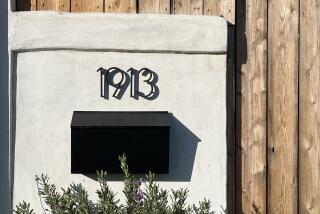Geocities Provides a New Kind of Neighborhood Watch
- Share via
On the Net, everyone has freedom of expression, and that has resulted in the creation over the last couple of years of millions of personal home pages.
At least one outfit has decided to take advantage of this seemingly irrepressible urge to pursue vanity publishing and has created a highly organized, easy-to-navigate, global approach to building, well, virtual neighborhoods.
The site is called Geocities (https://www.geocities.com). It exists solely to make money from our natural human instincts to puff out our chests, announce that we are here and what we say can make a difference.
The Santa Monica-based company offers free access to an Internet tool set and a mapped address book that lets Web “homesteaders” create a page in a “community” of their own choosing.
Then Geocities makes a business out of it by inviting advertisers and commercial vendors to market directly to these specialized neighborhoods, by offering deeper Web services to individuals and through transactions.
Here’s how it works:
A visitor to Geocities is directed to a listing of 27 (soon to be 28) themed “neighborhoods” that are built not by geography, but by self-sorted interest in topics of commonality.
There is an Athens neighborhood for those interested in education, teaching, literature and philosophy. There is a Bourbon Street area for fans of jazz, Cajun food and Southern hospitality. Cape Canaveral is a neighborhood for engineers, mathematicians, aviators and scientists.
Other neighborhoods include Colosseum (sports and recreation), Hollywood (movies and entertainment), Broadway (theater and show business), Paris (arts, fine wine and continental lifestyle), the RainForest (environmentalists), SoHo (bohemian artists and writers), Yosemite (outdoors) and SunsetStrip (rock, blues, grunge and punk).
You get the idea.
Individuals take an address in a residential area that serves as an Internet address code (or URL) and post whatever subject matter their hearts desire. There are some guidelines about being neighborly and avoiding offense, and members volunteer to police their communities to enforce the rule. As David Bohnett, chief executive of Geocities, says: “We think this is the power of the Web to link people. And what happens is that people start talking and working together to make things better.”
OK, so who are the 180,000 folks in the ‘hoods?
I went randomly to Athens and picked the 6400 block. I was pleasantly surprised to see the summary descriptions in several languages, clearly representing people from different parts of the globe (though none of them Greek in this sampling).
In the first “home page house” were poems by Lawrence Dionne and Beth Dalpe, the proprietors. Then I visited a site built with Korean characters by someone identified only as Vicky before moving on to Joseph “Yossi” Cotten’s very serious delving into the 10 Commandments and how they might be a better guide for my life.
At 6414 Athens, Yaki Nesher, an Israeli, invited me to tour his favorite basketball sites, including Michael Jordan’s. At 6421 Athens, Steve Goring presented his competing list of sites he finds interesting--on philosophy, religion, politics and sports. But then he also showed me pictures of his recent trip to Rio de Janeiro and invited me to an archive of his kids’ songs (with sound available.) I passed.
At 1124 Bourbon St., Bubbarat’s Home Page (by BJ Kelley) is a hometown guide for first-time visitors to New Orleans. Having been to New Orleans, I thought the advice sounded pretty good, basically steering visitors away from the tourist traps.
On Wall Street, Kent Campbell, a Kansas-based Small Business Administration official, offered his personalized and apparently authoritative guide to winning financing for your new small-business ideas. Then he, too, gave a tour of his own Web picks--which, naturally, include the home page produced by his wife, Pam Campbell.
Her page was back in the Athens area, reflecting her concern for education rather than high finance. Pam presented her second-grade class from Fort Leavenworth, Kan., with a reference to the “yuckiest site on the Web” and a useful guide of Web teaching tools.
My own pick was Brian Nuckels’ Trombonist’s Corner, with a review of his career as a musician in South Africa, pictures of the symphonies with which he plays and a guide to other trombone sites, a personal interest of mine.
Geocities invites its homesteaders to vote on their own cool site of the day. Sites earning honors among the neighborhoods this month include Yosemite 1015, a scrapbook of mountain climbing in Lebanon, Turkey, Iceland and Peru; the animated Silicon Valley Heights 1812 page; and the 1389 Bourbon St. site of a New Orleans saxophonist.
*
So what do we have here?
Is this an electronic version of talking over the back fence? Is it liberating to feel that because I can learn coding, I too can publish and people ought to listen?
Or is there a value that we see in having conversations around the water cooler at work and around the soccer field on the weekend? Maybe we long for a time when we did talk about that strange person in the corner house, about the new neighbor across the street, about the person I just met today at the park who turned out to be interesting. Maybe we want to slake our thirst for innocent gossip and we long to safely meet people who might just share our interests.
There’s probably psychological lore about feeling good when we find someone like ourselves and start a conversation or take part in a shared opportunity. Or it must amuse us to sneak a peek at one completely different. In our age, we insist that all of this exploration be made available from the safety of our own private Peeping Tom worlds.
And that’s where the computer comes in, the perfect machine with which to shout “Here I am!” in private and the perfect machine with which to decide which of the neighbors’ homesteads to peek inside. After all, by publishing, they’ve decided to leave the door open and the light turned on.






